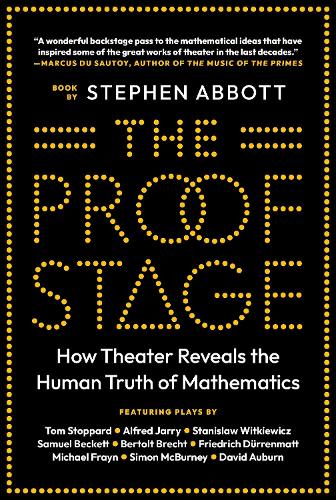
The Proof Stage: How Theater Reveals the Human Truth of Mathematics
(Paperback)
Available Formats
Publishing Details
The Proof Stage: How Theater Reveals the Human Truth of Mathematics
By (Author) Stephen Abbott
Princeton University Press
Princeton University Press
4th February 2026
United States
Classifications
Tertiary Education
Non Fiction
History of mathematics
Theatre studies
Performing arts
808.8036
Physical Properties
Paperback
416
Width 156mm, Height 235mm
Description
How playwrights from Alfred Jarry and Samuel Beckett to Tom Stoppard and Simon McBurney brought the power of abstract mathematics to the human stage.
The discovery of alternate geometries, paradoxes of the infinite, incompleteness, and chaos theory revealed that, despite its reputation for certainty, mathematical truth is not immutable, perfect, or even perfectible. Beginning in the last century, a handful of adventurous playwrights took inspiration from the fractures of modern mathematics to expand their own artistic boundaries. Originating in the early avant-garde, mathematics-infused theatre reached a popular apex in Tom Stoppard's 1993 play Arcadia. In The Proof Stage, mathematician Stephen Abbott explores this unlikely collaboration of theatre and mathematics. He probes the impact of mathematics on such influential writers as Alfred Jarry, Samuel Beckett, Bertolt Brecht, and Stoppard, and delves into the life and mathematics of Alan Turing as they are rendered onstage. The result is an unexpected story about the mutually illuminating relationship between proofs and plays - from Euclid and Euripides to Gdel and Godot.
Theater is uniquely poised to discover the soulful, human truths embedded in the austere theorems of mathematics, but this is a difficult feat. It took Stoppard twenty-five years of experimenting with the creative possibilities of mathematics before he succeeded in making fractal geometry and chaos theory integral to Arcadia's emotional arc. In addition to charting Stoppard's journey, Abbott examines the post-Arcadia wave of ambitious works by Michael Frayn, David Auburn, Simon McBurney, Snoo Wilson, John Mighton, and others. Collectively, these gifted playwrights transform the great philosophical upheavals of mathematics into profound and sometimes poignant revelations about the human journey.
Reviews
"A Choice Outstanding Academic Title of the Year"
"Abbott proves a companionable guide to the coincident developments in mathematics and theater, breaking down in laymans terms such concepts as non-Euclidian geometry and explaining just how they relate to Stoppard, Beckett, Brecht, Jarry, and other avant-garde playwrights."---Robert Erickson, The New Criterion
"[Abbott] masterfully interweaves mathematical ideas and theatrical works. . . . A wonderful gem for anyone interested in mathematics or theateror both. Encore!"---J. Johnson, Choice
"Extraordinary."---Paul J. Campbell, Mathematics Magazine
"Absorbing. . . . A joy to read but the most authoritative, comprehensive, and accessible account we have of the relationship between theatre and mathematics."---Kirsten Shepherd-Barr, The British Society for Literature and Science
"Throughout the book, Abbott offers many suggestions for why theater is an ideal tool with which to explore mathematical ideas." * Notices of the American Mathematical Society *
"An exhilarating and engaging study. . . . It has much to say on the interrelationship of drama and mathematics."---Carina Bartleet, Modern Drama
Author Bio
Stephen Abbott is professor of mathematics at Middlebury College, where he has been teaching for thirty years. He is the author of the widely used textbook Understanding Analysis and theater events chair for the Bridges Organization, a professional association dedicated to exploring the intersection of mathematics and art.
